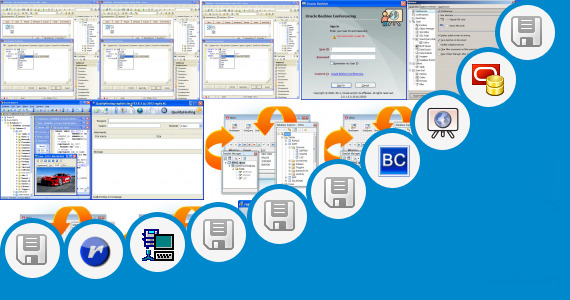Oracle 9i Client On Windows 7 64 Bit
I need to pratice in oracle 11g and please kindly send me 11g oracle free download software. Install oracle 9i in window 7 problem unable to run setup.exe for oracle(64 bit window 7) Window 7.
26 Nov 2009 in Since you come here probably looking for an answer, let me give it first. After that, if you have time, I’ll explain why it turned out to be that sort of hack, i.e. What other approaches didn’t work. How Download and install Oracle Clients 11g (which support lower DB versions) for 32 and 64 bits. I use the Instant clients which come with an install.bat for 32-bit and the OUI for 64-bit.


Open an elevated console and in%windir% system32 create a soft link to the 64-bit oracle client installation, while in%windir% SysWOW64 you make a soft link to the 32-bit installation. Making a soft link to a directory means using the mklink command as explained.
Visually it will display as such (I called my link 11g): Edit your PATH environment variable and add the following path to it: c: windows system32 11g. Please note that%WINDIR% will not be expanded in%PATH%. Richard Harvey Concerto Antico Pdf Files.
Background Currently I have Windows 7 64-bit running and Visual Studio 2008 32-bit installed on top of it. When I start our current large project since I make no restrictions on the compilation target of the projects the processes will fire up as 64-bit ones. These require a 64-bit oracle client when talking to a DB (otherwise you will get a BadImageException). However, within Visual Studio, when I kick off the Unit Tests written in (sadly, but factly) MSTest, the test runner gets started within Visual Studio and hence inherits its 32-bitness. Here, tests using the DB (you have a problem with that?) require the 32-bit oracle client. My first attempt revolved around using the%ProgramFiles% environment variable. Depending on the bitness of the process it points to either Program Files or Program Files (x86).
Unfortunately, you cannot reliably reference this variable in the PATH environment variable - neither in the system (where it remains unknown and does not get escaped) nor in the user variable (where it always escapes to the 64-bit version). A darker and more powerful kind of magic was required which came in the form of the. This son ensures that a process always gets the right dlls shown at windows system32, depending on it being a 32 or 64-bit process. This is the hack I hooked into with the symbolic links. That way I can have a constant path in my PATH variable that actually points to different locations depending on the process that looks at it.
In Unix If you don’t know the location or version of installed Oracle product, you can find it from the inventory which is usually recorded in /etc/oraInst.loc >cat /etc/oraInst.loc inventory_loc=/export/oracle/oraInventory **-->Inventory location** inst_group=dba >cd /export/oracle/oraInventory >cd ContentsXML Here look for a file inventory.xml >cat inventory.xml 11.2.0.2.0 2.1.0.6.0 Once you know the install location export ORACLE_HOME=full path to install location export ORACLE_HOME=/export/oracle/product/11.2.0.2 export PATH=$ORACLE_HOME/bin:$PATH A simple 'sqlplus' will give you the version of the client installed. >sqlplus SQL*Plus: Release 11.2.0.1.0 Production on Fri Mar 23 14: Copyright (c) 1982, 2010, Oracle.
All rights reserved. Enter user-name: In the above example, the version of Oracle client is 11.2.0.1 In Windows Registry location variable in windows is INST_LOC Start >Run >regedit >HKLM >Software >Oracle Check the Inst_loc entry value which will be the software installed location. You can use command prompt or you can navigate/explore to the oracle home location and then cd to bin directory to lauch sqlplus which will give you the client version information. Run the installer, click 'Installed Products.' This will give you a more detailed list of all installed components of the client install, e.g., drivers, SQL*Plus, etc. Typical Oracle installations will store inventory information in C: Program Files Oracle Inventory, but figuring out the installed versions isn't simply a matter of opening a text file.
This is AFAIK authoritative, and shows any patches that might have been applied as well (which running the utilities does not do). EDIT: A CLI option would be to use the OPatch utility: c: >path=%path%; c: >set ORACLE_HOME= c: >opatch lsinventory This gives you the overall version of the client installed. This is another, though not necessarily 'better', way: Determining Your Current Version To determine which Oracle client version you have installed on your pc, run sql *plus to connect to the DW. The folder names may vary somewhat based on your Oracle setup but should be similar. To run sql *plus choose start >programs >Oracle >Oracle - OUDWclient >Application Development >sqlplus. Enter your DW user name, password, and 'ordj' for the host name or service name. This should connect you to the DW via sqlplus.
At this point, you could write your own sql statements to pull information from the DW (if you knew sql). The Oracle client version can be determined in the first line - 'SQL*Plus: Release 10.2.0.1.0'. Oracle Client Information.